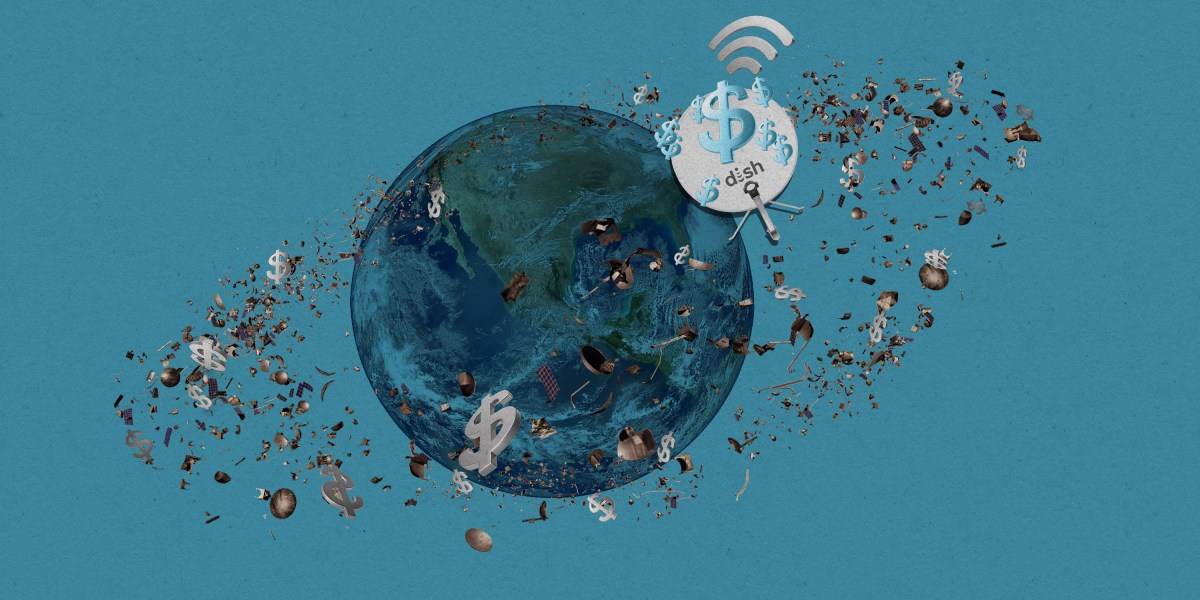Why the first-ever space junk fine is such a big deal

While there are no formal laws for clearing up space junk in the US or elsewhere, the FCC and other national regulators that approve satellites for launch are starting to adopt guidelines to prevent organizations from cluttering up space. The FCC now has a five-year rule for removing satellites in low Earth orbit—less than 2,000 kilometers above the planet’s surface—after the end of their mission.
For satellites in higher orbits, such removal isn’t always possible. Dish’s satellite, called EchoStar-7 and launched in 2002, was in geostationary orbit, about 35,000 kilometers above Earth’s surface. In 2012, Dish agreed on a plan with the FCC to move its satellite 300 kilometers higher into a so-called “graveyard orbit,” where defunct satellites are left orbiting Earth away from other satellites. However, in 2022 Dish revealed that the satellite only had enough fuel left to reach an orbit of about 122 kilometers, resulting in the settlement negotiated with the FCC.
“The settlement includes an admission of liability from the company and an agreement to adhere to a compliance plan and pay a penalty of $150,000,” the FCC said in a statement. A Dish spokesperson told MIT Technology Review the company “has a long track record of safely flying a large satellite fleet and takes seriously its responsibilities as an FCC licensee.” It added that the FCC “made no specific findings that EchoStar-7 poses any orbital debris safety concerns.”
Hanlon does not believe the fine went far enough. However, she says the crucial thing is that Dish admitted liability. If the EchoStar-7 satellite hits another satellite, the company could face further legal action.
Also, an FCC spokesperson told MIT Technology Review the agency could fine space-debris rule breakers more than $150,000 in the future. “This is a penalty set as part of a negotiated settlement,” the spokesperson said. “It is not necessarily indicative of a forfeiture amount.”
Legal action has been taken in space before. In 1978, Canada sued Russia over debris that rained down on its territory from a nuclear-powered satellite, eventually settling on an amount of more than $2 million. In 1979, the Australian town of Esperance jokingly fined NASA $400 after pieces of its Skylab space station fell in the region; a US radio DJ finally paid up in 2009. In 2018, the US startup Swarm Technologies was fined $900,000 by the FCC for launching satellites without permission.
But many incidents remain unresolved. In 2009, an active US satellite from the tech firm Iridium crashed into a dead Russian satellite, exploding into thousands of shards of metal. No settlement was ever reached. And the large number of inactive satellites and empty rockets in orbit today means the risk of further collisions remains high. “That’s a problem,” says Hugh Lewis, a space-debris expert at the University of Southampton. The FCC’s new willingness to take action may mean that satellite operators “have to put plans in place to make sure spacecraft deorbit successfully,” he says.
Hanlon says there are further measures that could be taken to discourage companies from failing to dispose of satellites properly. “Honestly, I would love to see that if you don’t meet your license requirements, you’re banned from launching for a number of years,” she says. “If you’re driving under the influence you can have your license revoked. These are the kinds of measures we need to see.”
Chris Johnson, a space law advisor at the Secure World Foundation in the US, says the loss of reputation for Dish about the satellite situation might be worse than any fine it could have received. “They promised to remove it and they didn’t,” he says. “It’s like the first operator of a car to get a speeding ticket.”
The fall in the company’s share price appears to be indicative of that reputational damage. The fine may not have been as severe as it could have been, but the FCC’s actions can be seen as a warning to other companies to tackle space junk. “This is going to be on their record and their reputation,” says Johnson. “It’s not trivial.”


